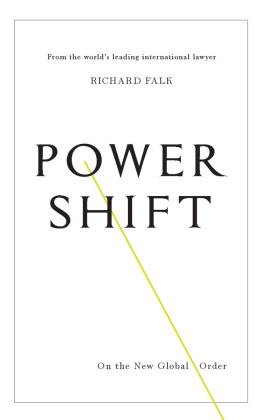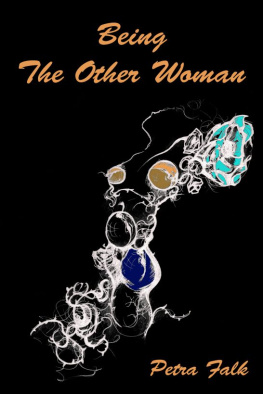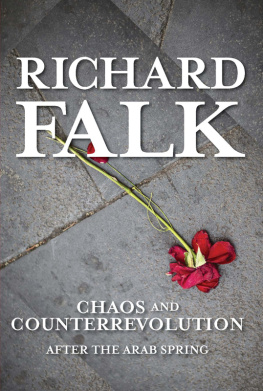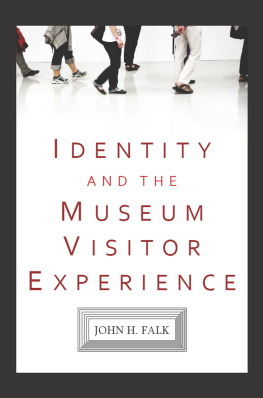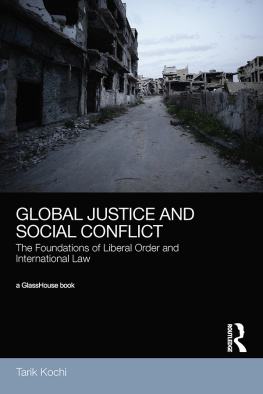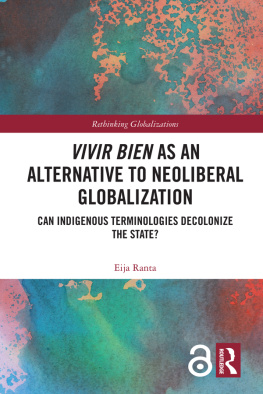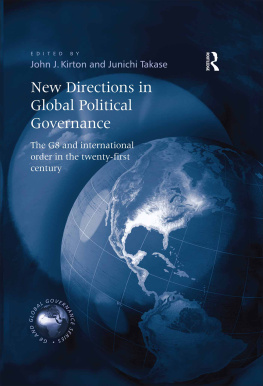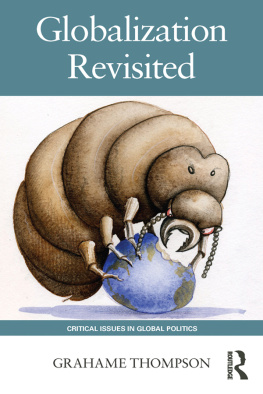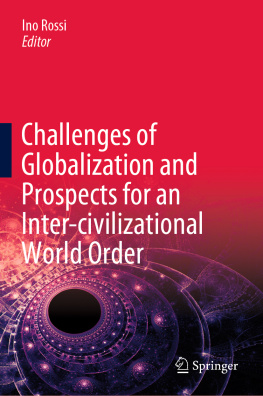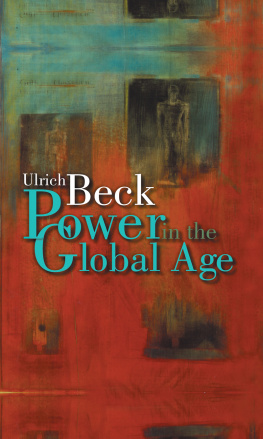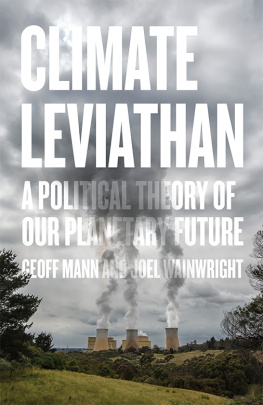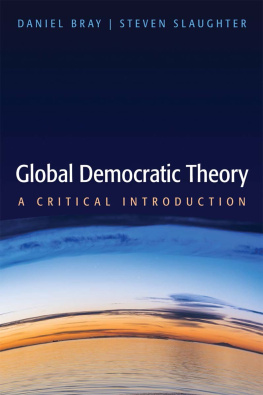
ABOUT THE AUTHOR
Richard Falk is Albert G. Milbank professor emeritus of international law at Princeton University, the author of over thirty books and a specialist on the role of international law in global politics. The United Nations Human Rights Council appointed Falk as the United Nations special rapporteur on the situation of human rights in Palestine from 2008 to 2014.
POWER
SHIFT
ON THE NEW
GLOBAL ORDER
RICHARD FALK

Zed Books
LONDON
Power Shift: On the New Global Order was first published in 2016 by Zed Books Ltd, The Foundry, 17 Oval Way, London SE11 5RR, UK
www.zedbooks.net
Copyright Richard Falk 2016
The right of Richard Falk to be identified as the author of this work have been asserted by him in accordance with the Copyright, Designs and Patents Act, 1988
Typeset in Haarlemmer by seagulls.net
Index: John Barker
Cover design: Kika Sroka-Miller
All rights reserved. No part of this publication may be reproduced, stored in a retrieval system or transmitted in any form or by any means, electronic, mechanical, photocopying or otherwise, without the prior permission of Zed Books Ltd.
A catalogue record for this book is available from the British Library
ISBN 978-1-78360-794-5 hb
ISBN 978-1-78360-793-8 pb
ISBN 978-1-78360-795-2 pdf
ISBN 978-1-78360-796-9 epub
ISBN 978-1-78360-797-6 mobi
In memory of Burns Weston
Exemplary Friend, Scholar, Humanist, Citizen Pilgrim
CONTENTS
ACKNOWLEDGEMENTS
Seeking to depict the changes and challenges affecting world order is a daunting undertaking, and is crucially reliant upon direct and indirect collaborative contact that can be only partially identified.
I have long benefitted from scholarly affinities and interaction with talented students of global politics and international law. Among those who have been especially influential in my own work, although no longer alive, I would single out Eqbal Ahmed, Burns Weston, Rajni Kothari, Yoshikazu Sakamoto, Ali Mazrui, Hedley Bull, and James Rosenau. Others who have been influential in the past, or more recently, include Saul Mendlovitz, Yasuaki Onuma, Georges Abi-Saab, Tom Farer, Marjorie Cohn, Ashis Nandy, Mary Kaldor, David Krieger, Hilal Elver, and Paul Wapner.
During work on this book, reflecting shared participation in academic conferences and projects, the ideas set forth here were particularly responsive to the thinking of Fred Dallmayr and Stephen Gill.
I am grateful to the Orfalea Center of Global and International Studies at the University of California, Santa Barbara for providing facilities and support while much of this book was being written, and thank particularly its executive director, Victor Faessel, for being invariably helpful to me.
I thank Kim Walker of Zed Books for her steady encouragement of my work, Dominic Fagan for efficiently managing the production process, and Jakob Horstmann for graciously and skillfully overseeing the two rounds of proofs.
This book is dedicated to recently deceased Burns Weston, whose long distinguished career as an engaged scholar has been inspirational for many of us. We shared a common jurisprudential outlook and mentoring background that derived from the work and vision of Myres S. McDougal, a giant of twentieth-century global public order studies. We also shared the belief, as actively expressed, that to be a scholar of integrity is inseparable from being a citizen of conscience. We believed this realization can only be authentically enacted in the twenty-first century by extending the circle of identification beyond the border of sovereign nations to encompass the whole of humanity, and as well, by coupling preoccupations about present concerns with a dedication to achieving a better future.
Some material was drawn from my chapters in previously published work, although it appears here altered and updated. I wish to acknowledge the following sources: Marjorie Cohn, ed., Drones and Targeted Killing (Olive Branch Press, 2015); Stephen Gill and A. Claire Cutler, eds., New Constitutionalism and World Order (Cambridge University Press, 2014); Amin Saikal, ed., Weak States, Strong Societies: Power and Authority in the New World Order (I.B. Tauris, 2016); Luca Mavelli and Fabio Petito, eds., Towards a Postsecular Politics: New Forms of Community Identity, and Power (Palgrave Macmillan, 2014); Stephen Gill, ed., Critical Perspectives on the Crisis of Global Governance: Reimagining the Future (Palgrave Macmillan, 2015). Also Kosmos: A Journal for Global Transformation (Fall/Winter 2014) and Great Transition Initiative: Toward a Transformative Vision and Practic e (online publication, 2015).
As in the past, my wife and partner, Hilal Elver, has abundantly provided the basic necessities of a good life: love, patience, and affirmation. Considering that she was formed by the feverish intensities of Istanbul, such a satisfying combination of qualities is rarely encountered.
INTRODUCTION
Globalism and globalization:
terrorism and state terror
The central theme of this collection of essays is an assessment of the subversion of the traditional hard power frameworks of statist world order. This process is giving rise to an ongoing and destabilizing struggle to shape an alternative soft power framework of a world responsive to changing conditions, challenges, actors, technologies, and goals. This struggle is carried on amid a bewildering array of contradictory local, national, regional, and global tendencies that are creating intellectual, ethical, and political confusion and frustration on levels of policy and social action, as well as public understanding. The outcome of this epic struggle will exert a great influence on the human condition as it evolves in the twenty-first century and is already reshaping the political imagination as it interprets this unfolding of world history.
There are many dangers and opportunities present in this atmosphere of foundational tension and innovation. The dangers include the intensification by the managers of old militarist patterns long relied upon to achieve order to overcome the decline in the effectiveness of traditional methods of solving problems and meeting security challenges in world society. This intensification of outmoded forms of geopolitics pose a variety of grave risks, which are to a varying extent accepted, acknowledged, evaded, denied by both political leaders and the public. In this way, risks are magnified, and a great deal of unnecessary human suffering takes place.
Among the greatest of these dangers are the responsive siren calls of political extremism often accompanied by regressive anti-modernist thinking that points the finger of blame at some vulnerable segment of the social or even cultural order, at enemies of the stability, civic order, and virtuous living that must be exterminated or walled out. Against the weight of such pressures governments and a compliant media even resort to reassurances of deliverance by divine intervention. There are an additional set of associated dangers that can be attributed to the rise of non-state political actors with large ambitions and a purist agenda directed at reshaping the social and political order, often by the most brutal imaginable means, accompanied by tactics seeking to disrupt normalcy by inflicting shocking harm and delivering threats of impending societal catastrophe. Such non-state movements have the audacity to declare a war on the established order and modernity itself as the sheltering and decadent edifice of values and ideas with fanatical fury. Governments respond by recourse to extreme securitization of public policy, rationalized by blaming minorities or immigrants for societal unrest and using the occasion to mobilize for perpetual war against terrorist enemies within and without, and preparing through prayer and diversionary politics awaiting a second coming or messaiah, debilitating the political order from acting prudently, humanely, and creatively in the face of unprecedented risks.
Next page
